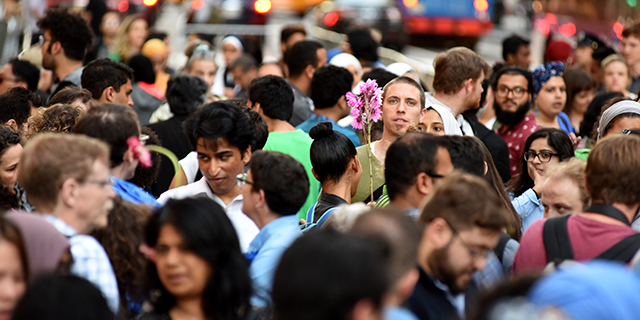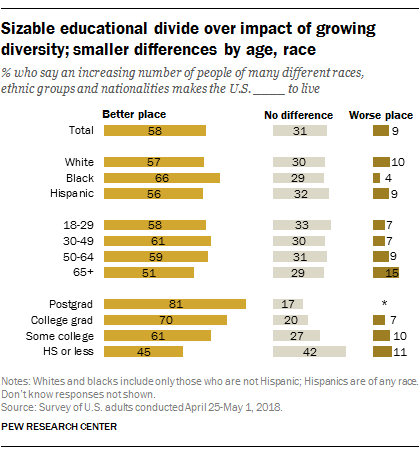
A majority of Americans continue to say the United States is a better place to live as a result of its growing racial and ethnic diversity.
About six-in-ten U.S. adults (58%) say that having an increasing number of people of different races, ethnic groups and nationalities in the U.S. makes the country a better place to live; just 9% say it makes the country a worse place to live, while about three-in-ten (31%) say it doesn’t make much difference either way, according to a Pew Research Center survey conducted in April and May. These attitudes are only modestly changed from last year.
 There remain wide differences in these views by party and ideology. Seven-in-ten Democrats and Democratic-leaning independents say growing diversity in the U.S. makes it a better place to live, including 78% of Democrats who describe themselves as liberal. A smaller majority of conservative and moderate Democrats (66%) say the same.
There remain wide differences in these views by party and ideology. Seven-in-ten Democrats and Democratic-leaning independents say growing diversity in the U.S. makes it a better place to live, including 78% of Democrats who describe themselves as liberal. A smaller majority of conservative and moderate Democrats (66%) say the same.
By comparison, about half of Republicans and Republican leaners (47%) see a positive impact of growing diversity in the U.S.; 37% say it doesn’t make much difference, and another 14% say it makes the country a worse place to live. While positive views among Republicans vary little by ideology, negative views are somewhat more widespread among conservative Republicans than moderate and liberal Republicans. About one-in-six conservative Republicans (17%) say growing racial and ethnic diversity makes the country worse, while just 7% of moderate and liberal Republicans agree.
Partisans also differ in the importance they give to living in a racially and ethnically diverse community: Democrats are about twice as likely as Republicans (75% to 38%) to say this is very or somewhat important to them, according to a Pew Research Center survey conducted earlier this year.
Across all age groups, about half or more say increasing diversity makes the country a better place to live. However, 15% of those 65 and older say growing ethnic diversity makes the U.S. a worse place to live, the highest among age groups.
 Views vary significantly by educational attainment, with more highly educated adults more likely to embrace growing racial and ethnic diversity.
Views vary significantly by educational attainment, with more highly educated adults more likely to embrace growing racial and ethnic diversity.
About eight-in-ten adults with postgraduate degrees (81%) say growing diversity makes the country a better place to live. Smaller, though sizable, majorities of college graduates (70%) and those with some college experience (61%) say the same. Among those with a high school degree or less education, attitudes are divided: While 45% say growing diversity makes the country a better place, 42% say it doesn’t make much difference and 11% say it makes the country worse.
Note: See full topline results and methodology here (PDF).


